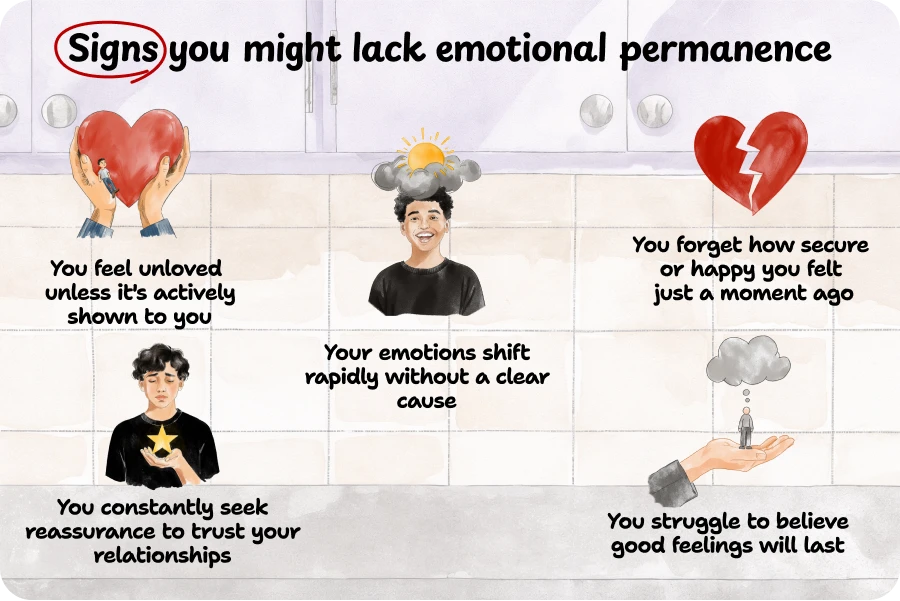Do you experience anxiety or unease when you are not with your loved ones? Have you ever found yourself spiraling after leaving a text to read for hours? Understanding emotional permanence may hold the key to finding the answer.
In this blog post, we will discuss what is called emotional permanence, why it is important, and how it can have a big impact on your mental health and your relationships.
What is emotional permanence?
Emotional permanence is the ability to hold onto positive feelings and memories from relationships even when you’re not directly interacting with the person. For example, knowing that you still love someone, even despite negative emotions toward them, for example, when you’re angry or upset with your partner.
It is a fundamental aspect of emotional intelligence that enables us to maintain emotional connections, healthy relationships, and self-awareness of our own emotions. Without it, you’re more likely to feel insecure and anxious when you don’t get constant reassurance from the people around you.
When we don’t trust that our feelings or the feelings of others will remain consistent, it’s challenging to build long-lasting bonds or maintain a stable sense of self.
How does emotional permanence develop?
The sense of emotional permanence usually develops in early childhood as part of cognitive development. Children understand that their caregivers’ love and care continue even when they are not physically present. This fundamental understanding serves as the foundation for strong attachments and healthy emotional regulation throughout one’s life.
Emotional permanence vs. object permanence
Infants learn object permanence around 8 months old. They realize that just because they can’t see their toy, it doesn’t mean it’s disappeared forever. Emotional permanence is the grown-up version of this.
However, some adults struggle to believe in the continuity of relationships and feelings, particularly during periods of absence or silence. Both are essential for mental and emotional stability, but emotional permanence in particular supports stable relationships and self-esteem.
What is emotional impermanence?
The propensity to lose touch with past or future emotional states, as though they don’t exist when you’re not experiencing them, is known as emotional impermanence. Due to your lack of emotional permanence, you can never be sure of other people’s feelings for you, and even if they tell you, you might not believe them.
Imagine a scenario where every time your partner leaves the room, you feel as though they’ve vanished from your life. That’s what permanence can feel like, living without an emotional permanence.
This lack can lead to feelings of abandonment and insecurity, significantly affecting one’s quality of life and ability to build emotional connections. In the long term, a lack of healthy emotional permanence can lead to a range of emotional health issues, from anxiety to unhealthy relationships.
5 signs you might lack emotional permanence
1. Always looking for reassurance of love
Seeking constant reassurance, as if they still care about you on a regular basis, may be a warning sign. It’s similar to needing a GPS to tell you that, despite the lack of turns, you’re still on the correct route.
Are you always seeking constant reassurance in your relationships?
2. Constant overthinking about relationships
Feeling anxious and overanalyzing every little detail is another symptom of emotional impermanence. There may be a lack of permanence in your relationship if you frequently imagine the worst-case scenario whenever someone doesn’t respond immediately to your text.
3. You can’t believe good feelings will last
It can be difficult to have faith that happiness or love will last. It may seem too good to be true, and you may find yourself waiting for it to end, with a part of you already anticipating its demise.
4. Frequent mood swings without clear reasons
The calm or joy you can be felt flike shades quickly, and when it does, it’s as if it never existed. You know you were fine, but you can’t feel it anymore, which makes the difficult moments feel even heavier. If your emotions change rapidly and for no apparent reason, you may have a lack of emotional permanence.
5. You feel unloved unless it’s actively shown to you
You begin to question its veracity if no one is stating it, texting it, or providing evidence of it at the moment. When love is given, it feels genuine, but when it stops, even for a short time, it seems to be gone.

Causes of emotional permanence issues
The Role of Childhood Experiences
Our early childhood experiences significantly shape our emotional development. You might struggle with emotional permanence if you grew up in an environment where emotions were not validated or acknowledged and you played one of the roles of a dysfunctional family.
If you were raised in a setting that did not recognize or validate emotions, you may have trouble with emotional permanence. For instance, children who don’t receive regular emotional support might struggle to comprehend and control their emotions.
Additionally, traumatic events can disrupt your ability to process and retain emotions, making it difficult to achieve emotional permanence. Therefore, it is true that emotional neglect or childhood trauma can have a significant effect on how you develop emotionally.
Impact of Attachment Styles
Attachment theory suggests that the type of bond you formed with your primary caregivers can influence your emotional stability. Those with insecure attachment styles, such as anxious preoocupied or fearful-avoidant attachment, are more likely to experience emotional permanence issues.
You can take the Breeze attachment style test to find out your attachment style, which can give you important information about your emotional patterns and how to deal with them.
The Brain’s Role in Emotional Permanence
The brain plays a vital role in how we process and retain emotions. Neurotransmitters like serotonin and dopamine are essential for mood regulation. [1] Imbalances in these chemicals can contribute to emotional instability.
Emotional permanence in ADHD
ADHD, or attention deficit hyperactivity disorder, could be another explanation for their mood swings and unstable emotions. Some people with Attention Deficit Hyperactivity Disorder (ADHD) may not be able to fully remember or hold on to an emotion they had in the past. This makes it harder for them to hold on to good feelings or let go of bad ones.
Influence of BPD on Emotional Permanence
It can be difficult for some people with Borderline Personality Disorder (BPD) to maintain emotional ties to objects or people who are not in the same room as them, since the most significant sign of BPD is a lack of emotional object permanence. BPD patients often experience emotional dysregulation, unstable relationships, and a severe fear of abandonment.
How emotional impermanence affects us
Here are some ways it can affect our lives:
- The Psychological Impact
Frequent emotional changes can result in anxiety, stress, and even depression. [2] When emotions are unpredictable, it is difficult to plan or anticipate future feelings, creating a sense of instability.
- Impact on Relationships
Maintaining stable relationships can be difficult for those who do not have emotional permanence. You and your partner may experience emotional exhaustion. The constant need for validation can deplete your emotional energy and impede the natural flow of the relationship.
- Work & Productivity
Without emotional object permanence, you may interpret a silent phone as a sign of disinterest rather than a busy day at work. It can help avoid unnecessary conflicts and misunderstandings. Furthermore, mood swings caused by a lack of emotional permanence can impair concentration, reduce productivity, and make interacting with coworkers or clients challenging.
How to develop emotional permanence
1. Assess your EQ level
If you’re ready to take the next step in developing emotional permanence. Discover your EQ score with a quick Breeze test and unlock your full potential.
2. Try to express emotions and communicate your needs
Many people with a lack of emotional permanence hesitate to admit that they struggle with reassurance, fearing it might push others away, or fear of perceived rejection. In reality, expressing your needs for more frequent emotional responses openly can build stronger bonds and develop emotional permanence.
If you have healthy relationships with partner, you can try talking with your partner with “I statements”, without making them feel guilty to evoke their defence mechanisms. By doing this, you relieve your friend or partner of the burden of “having to guess” and instead encourage cooperation where everyone is aware of what is required.
Here are several examples: “I get anxious when we don’t talk for a long time. It would be helpful if you could reassure me that we are fine, even if you are busy.”
3. Find voice/photo anchors
The nervous system often needs proof that the emotional connection is real. Collecting little reminders, like a kind text, a happy photo together, or a short voice note, can be grounding in moments of doubt. You can install it as your cover photo on your phone screen that you can look at every time you start to feel like something is going wrong with your relationships when your partner is not around.
4. Set predictable routines to reduce relationship anxiety
Consistent routines, shared rituals, or prearranged check-ins all contribute to predictability, which fosters safety and aids in emotional regulation. For example, you might agree with your partner that you’ll send a goodnight text each day, even if you don’t talk much during the day. You could also arrange a weekly coffee call with a friend.
5. Learn about your triggers
It’s natural to feel hurt if someone is distant or unavailable when you need them. What matters is what happens afterward. Instead of holding the pain inside or lashing out, try returning to the situation calmly later.
You might say, “When I didn’t hear from you yesterday, I started worrying I’d done something wrong. I know you were just busy, but I wanted to share what it was like for me.”
Try writing down a few “repair phrases”, for example, that you can use when your emotions are running high:
- “I know it wasn’t intentional, but I felt anxious when I didn’t hear back.”
- “I want to share my experience with you so that we can better understand one another, not to place blame on you.”
6. Get reality-checking questions ready
When you begin to ruminate about your relationships, instead pause and ask yourself: “What evidence supports my fear?” “If my best friend were in my place, what would I tell them?”. You can become more emotionally present and improve your emotional regulation with those reality checks.
7. Try the connection journal in the Breeze app
Each evening, jot down in the Breeze app one example of care you received: maybe a coworker checked in, your partner brought you tea, or a friend sent a meme that made you smile. This technique helps you develop emotional consistency and increases the visibility of positive interactions in your mind.
8. Make “future you” notes
Sometimes, reassurance is most powerful when it comes directly from the person you worry about. For example, “If I haven’t texted, it just means I’m busy,” could be the subject of a note to someone you care about. I still genuinely care about you. You can then ground yourself when the fear flares up.
During therapy, one client wrote, “I know right now you’re doubting whether your friends love you,” in future notes to herself. But do you recall when they arrived for you last week? That remains unchanged.
Sources:
- Sex-specific role for dopamine receptor D2 in dorsal raphe serotonergic neuron modulation of defensive acoustic startle and dominance behavior. Lyon KA, Rood BD, Wu L, Senft RA, Goodrich LV, Dymecki SM. eNeuro. 2020
- Broome MR, Saunders KE, Harrison PJ, Marwaha S. Mood instability: significance, definition and measurement. Br J Psychiatry. 2015.
- Effect of mood and worker incentives on workplace productivity. Decio Coviello, Erika Deserranno. The Journal of Law, Economics, and Organization, 2022
Disclaimer
This article is for general informative and self-discovery purposes only. It should not replace expert guidance from professionals.
Any action you take in response to the information in this article, whether directly or indirectly, is solely your responsibility and is done at your own risk. Breeze content team and its mental health experts disclaim any liability, loss, or risk, personal, professional, or otherwise, which may result from the use and/or application of any content.
Always consult your doctor or other certified health practitioner with any medical questions or concerns
Breeze articles exclusively cite trusted sources, such as academic research institutions and medical associations, including research and studies from PubMed, ResearchGate, or similar databases. Examine our subject-matter editors and editorial process to see how we verify facts and maintain the accuracy, reliability, and trustworthiness of our material.
Was this article helpful?








